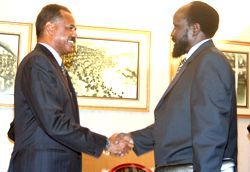Eritrea, Sudan discuss border re-opening
Dec 2, 2005 (ASMARA) — Eritrea and Sudan will start talks next week on opening their common border, closed in 2002 when Khartoum accused Eritrea of supporting Sudanese rebel groups, a senior Sudanese official said on Friday

Relations between Eritrea and Sudan have warmed since the September formation of a new Sudanese government that includes former southern rebel group, the Sudan People’s Liberation Movement (SPLM).
Al-Samani Al-Wasleea, one of two state ministers at Sudan’s Ministry of Foreign Affairs, said discussions in the Eritrean capital Asmara headed by Sudanese Foreign Minister Lam Akol could re-open the frontier.
“That depends on the outcome of these meetings which will start in maybe four days,” he told journalists in Asmara. “We are praying, hopeful.”
The announcement came after former SPLM leader and Sudanese First Vice President Salva Kiir finished a one-day visit to Eritrea, his first since taking office.
An article on Eritrea’s Information Ministry Web site, shabait.com, reported Eritrean President Isaias Afwerki saying: “It is the responsibility of both countries to create an atmosphere conducive to cooperation under conditions of peace and stability.”
Sudan and Eritrea have exchanged accusations of supporting insurgents on each other’s territory. The SPLM benefited from Eritrean support during its 21-year civil war against Khartoum.
And while Eritrea denies armed support for eastern rebels, it admits to helping with administration and logistics.
But Khartoum has an incentive to cooperate with Eritrea and eastern rebels, since increasing Sudanese oil exports must pass through eastern Sudan and out via Port Sudan.
Peace talks between Sudan and the Eastern Front rebel group are expected to begin in Libya later this month.
For its part Eritrea has a domestic stake in reopening the borders.
In March, a U.S.-funded food security report said closed borders with Ethiopia and Sudan meant a loss of about one-third of Eritrea’s traditional food markets, and contributed to an escalation of grain prices in Eritrea.
(Reuters)
